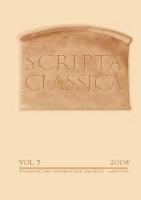Les reflets de l'idéologie indo-européenne dans le nom de l'«homme» en grec et latin
Reflections of indo-europeane ideology in name “man” in ancient Greek and Latin languages
Author(s): Katarzyna StępieńSubject(s): Language and Literature Studies
Published by: Wydawnictwo Uniwersytetu Śląskiego
Keywords: Indoeuropean linguistics; classical linguistics; ethymology; comparativeness
Summary/Abstract: The article raises the issues of the influence of the Pra-indoeuropean socio-religious ideology on the constitution of the Indoeuropean names describing the human being. The reflection of the religious conceptions is the Indoeuropean name of the human being ethymologically meaning an everyman and Earthling Bearing in mind the lack of precision in the word Earthling which can lead to both the opposition – people living on the Earth: gods living in heaven, and to the mythologically proved faith in the birth of the human being made of the earthly substance – the attempt was made to ethymologically precise the meaning of the human being in Latin. The second part of the article discusses the functioning of the Greek name of man "aner" as a synonym of "anrodos", being the reflection of a patriarchal system of Indoeuropean societies.
Journal: Scripta Classica
- Issue Year: 2008
- Issue No: 5
- Page Range: 45-50
- Page Count: 6
- Language: French

